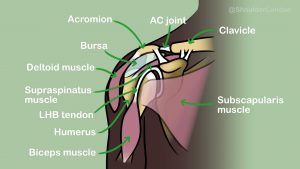
Shoulder pain can cause some patients to have to change their preferred sleeping positions and this can sometimes lead to difficulty falling asleep, poor sleep, and even neck pain and other discomfort from sleeping in an unusual position.
Several shoulder conditions are well known for causing sleep disturbance; these include frozen shoulder, rotator cuff problems, and shoulder bursitis. Shoulder injuries including fractures and dislocations, and shoulder operations can also affect sleep.
Frozen shoulder is an inflammatory condition that causes the lining (capsule) of the shoulder joint to become thickened, inflamed, and scarred, and leads to pain and progressive stiffness. Frozen shoulder is one of the top causes of shoulder pain that affects sleep.
The rotator cuff is a group of 4 muscles and their tendons that help to connect the arm bone (humerus) to the shoulder blade (scapula). They balance the ball of the shoulder (humeral head) on the socket (glenoid). The rotator cuff muscles are the supraspinatus (at the top, subscapularis (at the front), and infraspinatus and teres minor (at the back). Rotator cuff problems range from degenerative (wear and tear) problems, such as tendinopathy and chronic rotator cuff tears, to traumatic injuries, such as acute rotator cuff tears. Rotator cuff problems are a common cause of shoulder pain and sleep disturbance.
Shoulder bursitis or subacromial bursitis is one of the causes of subacromial shoulder pain. Bursitis is the inflammation of a bursa, and a bursa is a small fluid filled sac located over tendons to help them glide past several structures. We have bursae around several joints in the body including the shoulder, elbow, hip, and knee. The subacromial bursa is the bursa above the supraspinatus tendon (at the top of the shoulder) that helps the tendon glide under the acromion (flat bone at top of the shoulder). Patients with shoulder bursitis get pain when lifting their arm above shoulder height and can get night pain when laying on the affected side.
Nighttime Shoulder Pain Advice
The good news is that there are things you can do on your own to break the pain-sleep cycle. With changes to your lifestyle, and possibly the help of medication, you should be able to get back to a full night’s rest.
Sleep position is key to managing night-time shoulder pain, if you normally lay on the side that is affected then this is going to aggravate your shoulder pain. Some patients try laying on the opposite shoulder but even this can cause the affected shoulder to flop forward or backward and exacerbate pain. Laying on your back can cause the affected shoulder to fall backwards as you fall asleep, and this can lead to irritation. Those who lay on their front often do so with their arms up and hands above their head, but this is a bad position for your shoulders to be in for a prolonged period especially if they are already painful.
Pillows can sometimes be the answer to improving your sleep position by supporting or offloading the affected shoulder. This helpful video shows the 4 worst positions to sleep in with a shoulder problem and how you can adjust those positions and use pillows to help support your shoulder and improve sleep:
If pain is still a problem, there are several over the counter remedies you can use to self-manage and help to improve your sleep. Over the counter painkillers are an option, simple drugs like paracetamol and ibuprofen can help with shoulder pain but you should follow advice and consult your doctor if you have other medical problems or are taking other medications that may interact. It is important to take tablet painkillers at least half an hour before you go to bed, so they are acting on the pain before you try to fall asleep. I find topical painkilling gels aren’t as effective on the shoulder as they may be for other superficial joints such as the knee because the shoulder is deep and surrounded by muscles.
Ice packs or heat packs can also be helpful in controlling pain, but patients often don’t know which is best to use. My rule of thumb is as follows: if it is inflammatory (injury, fracture, frozen shoulder, bursitis) then an ice pack to cool down the shoulder is probably more effective, whereas if the problem is more muscular then warm compresses can cause muscle relaxation and help with pain. You can find a shoulder ice pack here (paid link).
Ultimately however the best way to solve sleep disturbance from shoulder pain is to treat the cause of the pain.
Non-operative Treatments for Shoulder Pain
Many causes of shoulder pain benefit from physiotherapy to stretch out tight tissue, improve posture, and strengthening weak shoulder muscles. The physiotherapist can help to improve your range of motion, which will make you more comfortable at night. If you would like us to recommend a good physiotherapist, please get in touch. We work with several excellent physiotherapists in and around London who have an interest in shoulders and can often help you to find good shoulder physiotherapists across the UK.
Other treatment options include a steroid injection to help with pain and inflammation. Corticosteroid injections can help relieve pain caused by frozen shoulder and increase your range of movement, particularly during the first stage of symptoms. However, not all conditions will be helped by steroid injections, and some conditions require steroid injections combined with physiotherapy to see resolution.
Treating Shoulder Pain with Surgery
For some conditions surgery may be the only treatment option, however most shoulder conditions can be treated non-operatively and surgery is only required if pain persists despite this.
Surgery for shoulder pain will ultimately help improve sleep but it can take some time before you can lay directly on an operated shoulder. After an operation, especially if you’re in a sling, you will need to follow advice about sleep position and use of painkillers and ice packs. We have all the information about shoulder surgery recovery here.
This video shows how to support your arm after a shoulder injury or surgery when wearing a sling:





